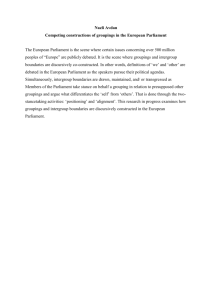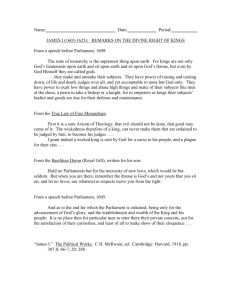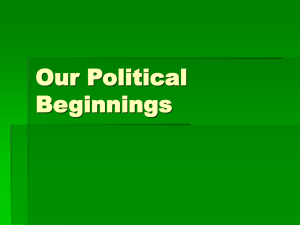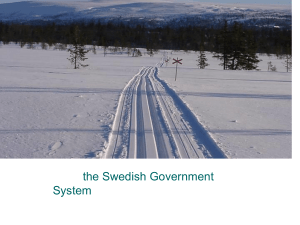The Foreign Policy Makers in France:
advertisement
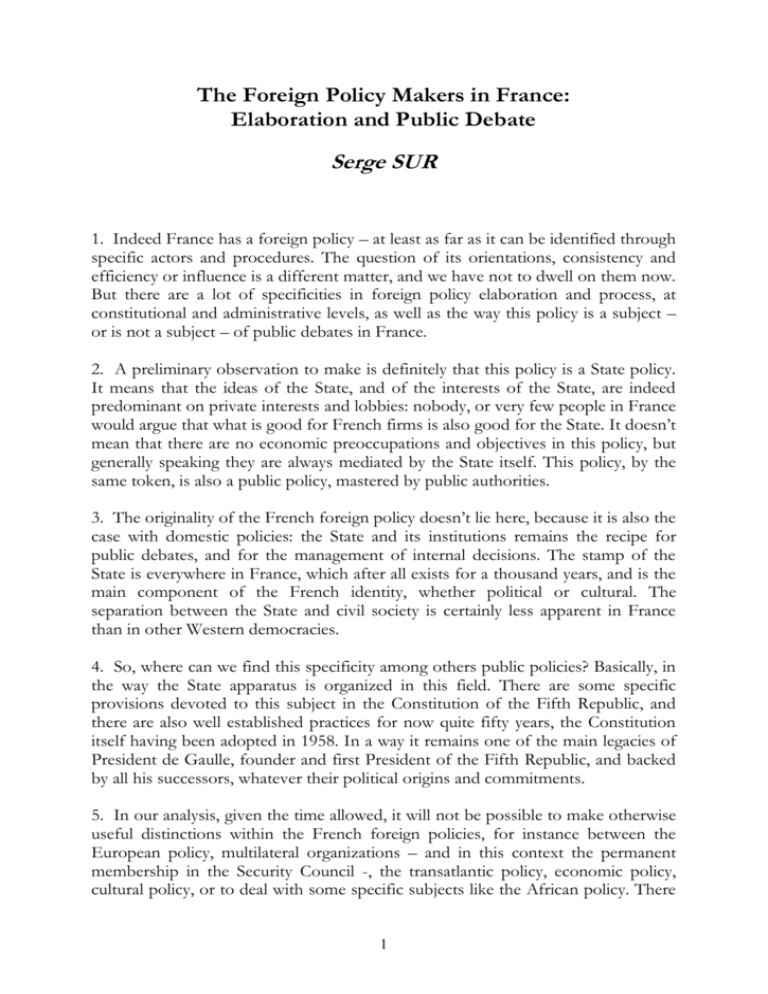
The Foreign Policy Makers in France: Elaboration and Public Debate Serge SUR 1. Indeed France has a foreign policy – at least as far as it can be identified through specific actors and procedures. The question of its orientations, consistency and efficiency or influence is a different matter, and we have not to dwell on them now. But there are a lot of specificities in foreign policy elaboration and process, at constitutional and administrative levels, as well as the way this policy is a subject – or is not a subject – of public debates in France. 2. A preliminary observation to make is definitely that this policy is a State policy. It means that the ideas of the State, and of the interests of the State, are indeed predominant on private interests and lobbies: nobody, or very few people in France would argue that what is good for French firms is also good for the State. It doesn’t mean that there are no economic preoccupations and objectives in this policy, but generally speaking they are always mediated by the State itself. This policy, by the same token, is also a public policy, mastered by public authorities. 3. The originality of the French foreign policy doesn’t lie here, because it is also the case with domestic policies: the State and its institutions remains the recipe for public debates, and for the management of internal decisions. The stamp of the State is everywhere in France, which after all exists for a thousand years, and is the main component of the French identity, whether political or cultural. The separation between the State and civil society is certainly less apparent in France than in other Western democracies. 4. So, where can we find this specificity among others public policies? Basically, in the way the State apparatus is organized in this field. There are some specific provisions devoted to this subject in the Constitution of the Fifth Republic, and there are also well established practices for now quite fifty years, the Constitution itself having been adopted in 1958. In a way it remains one of the main legacies of President de Gaulle, founder and first President of the Fifth Republic, and backed by all his successors, whatever their political origins and commitments. 5. In our analysis, given the time allowed, it will not be possible to make otherwise useful distinctions within the French foreign policies, for instance between the European policy, multilateral organizations – and in this context the permanent membership in the Security Council -, the transatlantic policy, economic policy, cultural policy, or to deal with some specific subjects like the African policy. There 1 would be some nuances to make in this respect, but let’s try to identify the main common characteristics. From this point of view, it seems necessary to consider at the same time the foreign policy and the defence policy. They are intertwined, despite the fact that they belong to different ministries, and they share the same characteristics, as they are the two main tools of the French external action. 6. To sum up these characteristics, I would like to emphasize five points : The central role of the presidency – The secondary role of the government – The specific influence of the foreign ministry and of the diplomatic apparatus, superseding the would-be influence of the Think Tanks and of the NGOs – The lesser role of the Parliament – and finally the contrasted role of the public opinion, which will lead to a conclusion, about the political consensus and dissension in France about the Foreign policy considered as a whole. I. - The central role of Presidency 7. This central role derives from the Constitution itself, and is confirmed by its practice. As far as constitutional provisions are concerned, the President exerts both representative and substantial functions. He appoints the ambassadors, he negotiates and ratifies international treaties, with, in some cases only, the authorization of the Parliament. He is also responsible for their implementation at the international level. He is also the commander in chief of the armed forces, and legally in charge of the decisions concerning the nuclear deterrent. The consent of the Parliament is not necessary for the use of armed forces, apart a formal declaration of war which is not necessary nowadays : either the armed forces are used with an authorization of the Security council, or they are used in the context of a formal alliance, in both cases implementing international commitments of the State. And, for the Security Council for instance, in 2003, the decision to oppose any resolution from the SC backing a military intervention against Iraq was a presidential decision. 8. In practice, all the successive Presidents have been internationally very active. They participate regularly to international Summits, G 8 for instance, or to the UNGA regular annual sessions. They follow the negotiation and conclusion of the main political treaties, and sometimes directly, as in the European Summits. Indeed, the President is at the origin of the main orientations of the French foreign policy, and of their continuity. At the military level, he has also used intensively his powers, deciding for instance either to suspend (1992) or to resume (1995) the French nuclear tests, before deciding their definite cessation and the French participation to the CTBT (1996). The President has also decided, in 1995, to send a robust intervention force in Bosnia, and, for instance, to increase substantially the French participation to UNIFIL in 2006. 2 II. - The secondary role of the Prime Minister and of the Government 9. Generally speaking, the duality between the Presidency and the Government in the Executive branch is a specificity of the Fifth Republic. In the international field, the Prime Minister and the Government are not deprived of powers and influence, even if they have fewer powers than in the domestic field. In European matters, nevertheless, it is difficult to distinguish between the domestic and the international field. At the international level, the Government has to approve the appointment of the ambassadors, and it may also negotiate and conclude international executive agreements. It is also in charge of the domestic implementation of international agreements. But, as far as the political majority in the Parliament is in accordance with the electoral majority of the President himself – who is elected by the vote of all citizens -, it means that the Presidency and the Government are in the same political line, and that the effective master of the public policy is the President, directly for the general directives, through his collaborators for the day by day policies. 10. We must nevertheless contemplate another possibility, which occurred three times in the course of the Fifth Republic – in 1986, 1993, 2002: the hypothesis of a contradiction between the political majority in the Parliament and the political orientations of the President. As the Fifth Republic remains basically a parliamentarian regime, the Government is the expression of the majority of the National Assembly. The Prime Minister could thus be in opposition with the President, and there is a need of a minimal agreement between them in order to make their “cohabitation” possible. In the domestic field, the Government is rather free to implement its own policy, and it is the role of the President that becomes secondary. But in the international field, whether diplomatic or military, given the presidential prerogatives, it is absolutely necessary that both authorities concur in the main orientations. Fortunately, it was the case during the three practical cohabitations, with some exceptions – for instance, an agreement in the economic multilateral field, the Blair House agreement, in the nineties, had to be renegotiated due to the change of parliamentarian majority – which was accepted by the President. But, in the case of the treaty establishing a Constitution for Europe, the main orientations were accepted by President Chirac and Prime Minister Jospin, in a context of cohabitation. III. - The specific role of the Ministry of Foreign Affairs 11. Indeed the Ministry of Foreign Affairs has an eminent and traditional role, not only in the implementation of foreign policy decisions, but also in their very definitions. It is due in part to its place in the political-administrative apparatus, 3 which belongs to a more than secular tradition of the successive French Republics, and for another part to the professional quality and to the solidarity as a group of the diplomatic corps. And France keeps one of the main diplomatic networks all around the world. It is an elite, both by its recruitment, by a very selective process, and by its origin – diplomats are globally coming from the upper class, or from the upper middle class. Even in the French administration, whose high level is selected by the Ecole Nationale d’Administration, the Quai d’Orsay, “le Département”, or “la Carrière”, remain very prestigious. 12. The Quai d’Orsay embodies a reservoir of knowledge, experience and wisdom of which French diplomats are both fully aware and proud. Besides, the diplomatic corps is able to manage the career of its members, the allocation of tenures and posts, and the political apparatus must take it into consideration. For sure, it is not in a position to define by itself the Foreign policy, especially when new decisions have to be taken. But it is able to put them in a larger perspective, in the perspective of the traditions and of the consistency of the traditional French foreign policies, and to smooth the moves which could be perceived as too far and too fast. The diplomats have the legitimate feeling of being the servants of the State, of its permanent interests and positions, and not the domestics of transitory governments. It could be a matter for further analysis and explanations, but let’s stop at this for the time being. I would just like to highlight two consequences. 13. Firstly, by comparison with other Western democracies, the NGO’s political role in France is rather limited. Indeed there are in France a lot of active NGO’s, specifically in the field of human rights, humanitarian law, and humanitarian assistance. Everybody knows Médecins sans frontière, or Médecins du Monde, among others, and the name of Bernard Kouchner is a popular one. But in fact they do not really influence the foreign policy. From time to time, it is certainly possible to note that this policy is influenced by some coalitions of NGO’s – for instance, with the Roma Convention of 1998 on the International Criminal Court, or with the Montreal Convention on anti personal mines. But it was more by international coalitions, in which the French NGO’s were playing a limited role. On the contrary, the Ministry of Foreign Affairs, as well as the Ministry of Defence, are able to use the NGO’s for their own purposes, and in a way to use them as tools. The relationship is more one of partnership than of lobbying from the NGO’s, despite some appearances. It’s another example of the central role of the State apparatus in the public life in France. It is for example symbolic that M. Bernard Kouchner, coming from the NGO’s, was appointed minister in several governments. 14. Second, the role of the Think Tanks, still in comparison to other Western democracies, also remains a limited one. There are a lot of reasons to explain why the Think Tanks are globally underdeveloped in France, and for instance the lack of recognition of the study of international relations as an academic formation and 4 topic. Another explanation is the central role of the State, which doesn’t facilitate the private funding of independent research centres. But it is also a consequence of the traditions of the Quai d’Orsay, and of the idea that diplomats do not need academic expertise. They frequently dismiss it as theoretical, poorly informed or ideological. They sure pay a lip service to the importance of expertise and of external consultants, but they rarely take their advice into consideration. This situation is indeed evolving, and some Think Tanks are beginning to emerge, but the trend remains limited. And when some Think Tanks are mobilised, it is more as a tool for the French diplomacy than for an independent evaluation of the French foreign policies. IV. - The intermittent role of the Parliament 15. In the global context of the Fifth Republic, and by comparison with the previous ones, the role of the Parliament has been dramatically reduced. It has been reduced in order to rationalize and stabilize the governmental life, which before that was very instable. Fifty years after, more and more voices are emerging from all the political parties, claiming a renewal and an extension of Parliament powers. But these claims do not seem to apply to the international powers of the Parliament, despite the fact that it is even more limited in this field than in the others. In fact, under the previous Republics, the international powers of the Parliament were also strictly limited. 16. The Parliament has indeed to authorize the ratification or the approval of international agreements, but in some areas only – in particular, the treaties establishing military alliances are not concerned. And the rights of the Parliament in the discussion of the texts of the international agreements are very restricted: it can only adopt or reject the text, without any modification or interpretation. In fact, the parliamentarian discussions about international agreements are frequently symbolic, and, under the Fifth Republic, no one was ever rejected by the Parliament. To the contrary, one was rejected by the National Assembly, under the Fourth Republic, in 1954, the treaty establishing a European Defence Community. 17. It could happen, and it happened several times, that the ratification of a given treaty should need a preliminary modification of the Constitution, because this treaty embodies provisions which are contrary to the Constitution. In this case, the Parliament is requested to adopt the requested modification, which it has regularly made, in the European building process notably, but also for the entry into force of the International Criminal Court. The general idea, traditional in some respect, is that the Parliament feels that it belongs to the Executive branch to play the leading role in international relations, and this idea is largely accepted in France. 5 18. As far as the use of force is concerned, we have already noted that, apart for a formal declaration of war, it has not to be authorized by the Parliament. It could happen nonetheless that, without any legal obligation, the government informs the Parliament, or that the President sends a message to the Parliament. In some cases, the government could request a vote of approval, in order to increase the legitimacy of the decisions, but it is not the regular practice. It is a political tool to obtain a manifestation of support, but it is not a legal obligation. V. - Public opinion and popular votes 19. A particularity of the Fifth Republic is the possibility to ask the people to decide directly on important matters, through referendums. It has been used several times, and it is not a symbolic procedure, because two of these referendums got negative results – in 1969, provoking the departure of President de Gaulle, and in 2005, about the treaty establishing a European constitution. It was indeed a very important decision. Does it mean that international questions are a subject of serious dissension among the citizens or between the leaders and the citizens? Certainly not, and this event, as spectacular as it is, remains an exception. 20. What is more striking in fact is the French consensus about international matters. Despite the vivid opposition between the political parties from the left and from the right, international subjects are rarely a subject of dissension among the political parties, and in the public opinion. For instance, the nuclear deterrent force, the presence of French soldiers in Afghanistan, the French position towards the Iraqi war, and more generally the idea that France is an ally but not a subordinate of the United States, the French position about the Israeli Palestinian conflict, or about the military operation of Israel against Lebanon, were not or are not really challenged. There is also a large support for the Kyoto agreement, the cessation of nuclear tests, the International Criminal Court, to take a few examples. 21. This consensus derives in part from bad reasons: among them a lack of interest; a lack of information – the French media seldom make a priority of international matters; the feeling that the events are not affecting the French people’s daily life, or than in any case France has no grip on the situation, and should simply remain quiet about it. But, on the contrary, and this a more positive reason, numerous French people share the feeling that France has to play a role, and should express freely its own positions. In this respect, the French permanent membership of the Security Council is welcome, as well as its consequences, namely the maintenance of military armed forces able to intervene at the request or with the authorization of international bodies for the sake of international security. Also, there is the idea that the European building process is the new frontier for France. So, when we look at these various reasons, it is clear that there is some 6 ambiguity in the consensus – as in every consensus, because in fact consensus is made for people who disagree. 22. Indeed the next presidential elections, in 2007, as the president is elected by a popular vote, will give an opportunity to evaluate this consensus, and to confirm it or to weaken it. Will the international subjects be a component of the presidential battle? It is too early to tell it. We have already seen some skirmishes about it, for instance about transatlantic relations. But the negative vote on the Treaty establishing a constitution of Europe has not created permanent political lines of divide between would-be candidates. And, for the time being, the opinion polls seem to indicate that the international positions taken by President Chirac during the eleven years of his tenure are largely approved, by contrast with his balance sheet on the domestic policies. 7




